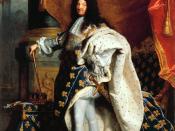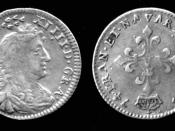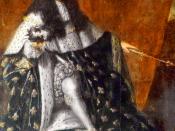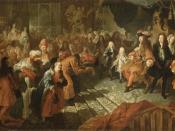Louis XIV was an absolute monarch. He was often called "the Sun King," and ruled over France. He wanted to help France achieve economic, political, and cultural pinnacle. Many historians believe the phrase "absolute power corrupts absolutely" mirrors Louis XIV's reign. Louis XIV revoked the Edict on Nantes, changing the economy of France in one motion. By creating the city of Versailles and being a major patron of the arts, Louis was very influential on French culture. His costly wars and failures almost led to France's bankruptcy. Louis XIV was very corrupt in his power. It's shown in all he did to change France. He got what he wanted, when he wanted it.
Louis XIV's reign brought a large economic gain and severe economic recession. He was the first king to embrace mercantilism in his country as the form of economy. Unfortunately, Louis was a devout Catholic, and ruined his economy with one move.
He revoked the Edict of Nantes, the document that said that Huguenots could worship Protestantism in peace. This infuriated the Huguenots, and they left with their skills. By the loss of upwards to 200,000 skilled workers and business leaders, France's economy plummeted.
Louis' cultural goals were a large success. He changed French trends and etiquette. He supported several art movements and artists by encouraging and financing them. France led Europe in the arts due to Louis XIV. He loved music and theatre. Louis XIV was a great patron of the arts. He created the city of Versailles by turning his father's hunting cabin into a grand palace. Construction began in 1668, and wasn't done until 1710. Showing his impatience, Louis XIV moved in 1682. Politically, Louis XIV was corrupt because of his greed. He fought costly wars, both life and money. His country was the most powerful and populous. His armies were large in size at peace time and even larger in wartime. His wars left France almost bankrupt. He wanted larger borders, went to any extent to get them, but lost all of the three times he tried. He killed many men, especially in the War of Spanish Succession, which led to the end of his reign.
Economically, culturally, and politically, Louis XIV was corrupt and tried to get more. His economic and political aspirations failed, while his cultural plans were a huge success. He dominated Europe culturally, but not militarily. He changed a lot for France, for the better and for the worse.
works citedSpeigl, Western Civilization vol 2





